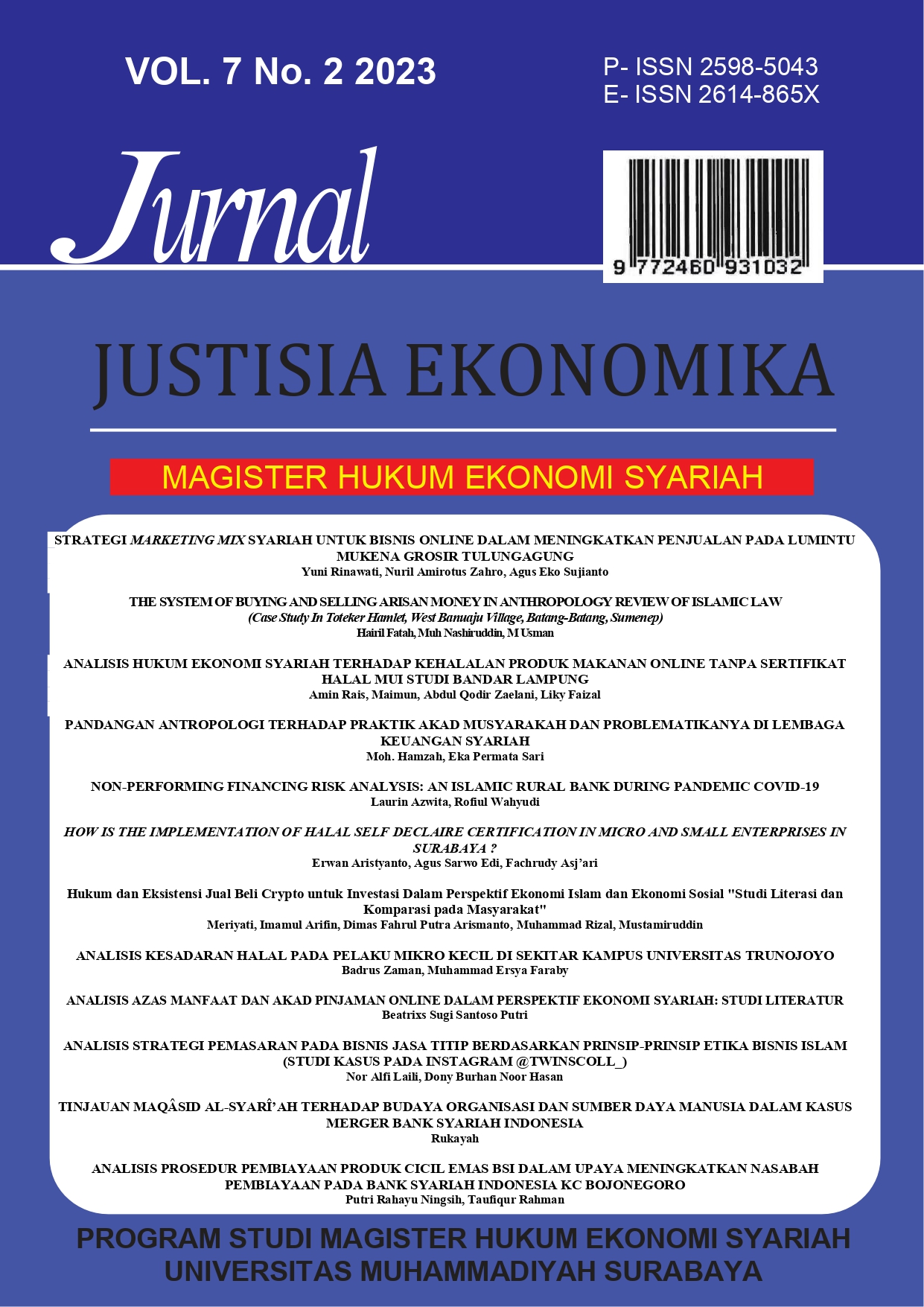ANALISIS KESADARAN HALAL PADA PELAKU USAHA MIKRO KECIL DI SEKITAR KAMPUS UNIVERSITAS TRUNOJOYO MADURA
DOI:
https://doi.org/10.30651/justeko.v7i2.20470Keywords:
Halal, Halal Awaren, UMKM ActorsAbstract
In today's developments, the most common object for business actors is small businesses such as selling food, snacks and others. People need to ensure that the products they consume are halal and their halalness is guaranteed by the government. This research aims to see the results of halal awareness among business actors. micro and small businesses around the Trunojoyo Madura University campus, this research uses qualitative methods because it collects information through interviews, observation, documentation and analysis of informant data with 10 micro and small business actors around the Trunojoyo Madura University campus, thereby producing data analysis and getting appropriate answers with informants, this research data also uses primary and secondary data techniques. The results of the research show the level of halal awareness of micro and small business actors around campus, one of which said that it depends on the flow that a person follows and some of them remain by Islamic law.
References
Amalia, Novi Rizka., 2017, “Untuk Realisasi Identitas Politik Islam Di Indonesia.” Dauliyah : Journal of Islamic and International Affairs 2, no. 1: 31–50. https://ejournal.unida.gontor.ac.id/index.php/dauliyah/article/view/806/681.
Borzooei, Mahdi and Maryam Asgari., 2015, “Country-of-Origin Effect on Consumer Purchase Intention of Halal Brands.” American Journal of Economics, Finance and Management, 1(2): 25–34.
Bukhari, S. F. H., Woodside, F. M., Hasan, R., Shaikh, A. L., Hussain, S., & Mazhar, W., 2019, “Is Religiosity an Important Consideration in Muslim Consumer Behavior: Exploratory Study in the Context of Western Imported Food in Pakistan.” Journal of Islamic Marketing 10(04): 1288–1307.
Creswell, J. W., & Creswell, J. D., 2017, “Research Design: Qualitative, Quantitative, and Mixed Methods Approaches. Sge publications.,”.
Denzin, Norman K. &Yvonna S. Lincoln.,1988, “Strategies Of Qualitative Inquiry. Thousand Oaks: Sage Publications.,”
Databooks, 2020, “Potensi Sektor Industri Halal Di Indonesia,” https://halal2us.com/potensi-sektor-industri-halal-di-indonesia/.
Hasan, H. “A., 2016, Study on Awareness and Perception Towards Halal Foods A Muslim Students In Kota Kinabalu, Sabah. In Proceedings of the Australia-Middle East Conference on Business and Social Sciences 2016.” Dubai: in partnership with The Journal of Developing Areas, Tennessee State University, USA., 803–11.
Jawhari. “Al-Jawahir FiTafsiril Que’an Al-Karim Juz 1,” t.t., 157-225.
KBBI., 2023, Makna Kesadaran. Diakses 4 Oktober 2023. https://kbbi.web.id/sadar.
Kurniawati, R V, Valck, K. de, Wojnicki, A. C.,& Wilner,S.J.S., 2019 “Awareness Analysis of Indonesia Consumer Toward Halal Products.” Journal of Islamic Marketing 11(01): 522–46.
M. Ali., 2016, “Konsep Makanan Halal dalam Tinjauan Syariah dan Tanggung Jawab Produk Atas Produsen Industri Halal.” Ahkam:Jurnal Ilmu Syariah 16(02)
Makhtum, Ahmad, dan Muhammad Ersya Farabi., 2021, “Pemetaan Potensi Sertifikasi Halal Pada Sektor Produk Makanan dan Minuman Unggulan di Kabupaten Bangkalan.” PROCEEDINGS IHTIFAZ: Islamic Economics, Finance, and Banking.
Meilanova, D. R., 2019, “Menag: Kesadaran Masyarakat Gunakan Produk Halal Meningkat,”. https://kabar24.bisnis.com/read/20190116/79/879264/menag- kesadaran-masyarakat-gunakan-produk-halal-meningkat.
Nashirun., 2020, “Makanan Halal Dan Haram Dalam Perspekrif Al-Quran.” Jurnal Kajian Manejemen Halal dan Pariwisata Syariah 3(2).
Nur Fika., 2023, wawancara Pelaku Usaha Menengah di sekitar Kampus Universitas Trunojoyo Madura, 2 Oktober 2023.
Nurhayati, T., & Hendar.,2019, “Personal Intrinsic Religiosity and Product Knowledge on Halal Product Purchase Intention: Role of Halal Product Awareness.” Journal of Islamic Marketing 11(09): 603–20.
Nurul Mauludiyah, Warsidi., 2023, The Joints of Economic Strength According To Ibn Khaldun, Jurnal: Paradigma (Scientific Studies on Science, Religion and Culture), Vol 20, No 1, ISSN: e-ISSN: 2775-9105, p-ISSN: 0853-9081, DOI: https://jurnal.unismabekasi.ac.id/index.php/paradigma/article/view/5931/2480
Pambudi., 2018, “Pengaruh Kesadaran Halal dan Sertifikasi Halal Terhadap Minat Beli Produk Mie Instan(Studi pada pemuda muslim bandar lampung),”
Pramintasari, T. & Fatmawati, I., 2017, “Pengaruh Keyakinan Religius, Peran Sertifikasi Halal, Paparan Informasi, dan Alasan Kesehatan Terhadap Kesadaran Masyarakat Pada Produk Makanan Halal.” Jurnal Manajemen Bisnis 8(1) : 1–33.
Rofi’atul., 2023, wawancara Pelaku Usaha Menengah di sekitar Kampus Universitas Trunojoyo Madura, 2 Oktober 2023.
Rosita, A. et al., 2023, “Implementasi Sertifikasi Halal pada Produk Makanan dan Minuman UMKM Di Kecamatan Bantan Kabupaten Bengkalis.” Jurnal Ilmiah Multidisiplin 1(2) : 92–97.
Santi., 2023, wawancara Pelaku Usaha Menengah di sekitar Kampus Universitas Trunojoyo Madura, 2 Oktober 2023.
Silverman, D., 2026, “Qualitative Research. Sage.,”
Sudaisi et al., “Mengenai Tafsir & Mufasir EraKlasik Dan Kontemporer,” t.t., 107–8.
Databooks.,2023, Penduduk Indonesia tembus 278 juta jiwa https://databoks.katadata.co.id/datapublish/2023/07/13
Kelurahan Sukorejo Semarang, 2023, https://sukorejo.semarangkota.go.id/umkm diakses 9 Oktobr Jam 13:13.
Downloads
Published
How to Cite
Issue
Section
License
HAK CIPTA
Penulis yang mengirimkan artikel dalam jurnal Justisia Ekonomika harus memahami dan menyetujui persyaratan tentang hak cipta jurnal Justisia Ekonomika sebagai berikut:
1. Hak Cipta tulisan / artikel yang diterbitkan di jurnal Justisia Ekonomika otomatis menjadi hak pengelola jurnal atau publisher
2. Meskipun Hak Cipta atas tulisan yang telah diterbitkan di jurnal Justisia Ekonomika adalah menjadi haknya publisher, tetapi penulis masih mempunyai hak untuk : a). Penulis boleh meng-upload di repository kampus, b). Penulis boleh meng-upload di webnya sendiri, c). Penulis boleh meng-upload di google schoolar, orchid dan sinta
LISENSI
Lisensi atas tulisan / artikel yang diterbitkan di jurnal Justisia Ekonomika adalah menggunakan Creative Commons dengan atribusi CC-BY-NC 4.0






















